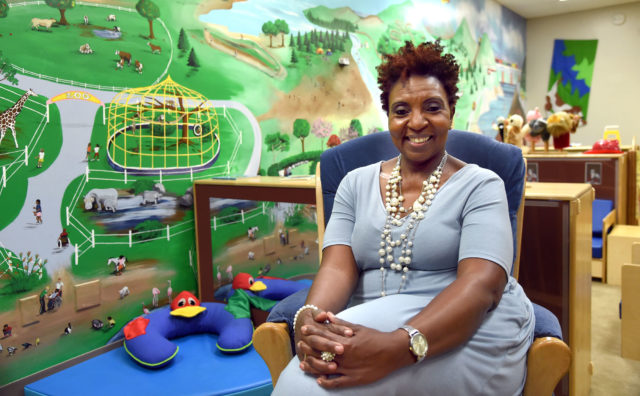
By Erica Wright
The Birmingham Times
Whether helping with children in day care or older people in need of assistance, Vikki Forte would make time to serve others while she was growing up.
“It’s been that way all my life,” said Forte, UAB Early Head Start Family and Community Services Coordinator.
“I’ve always had a passion for people, and I volunteered at day cares. My aunt ran a day care, so I volunteered there with her. My mom was a caregiver of elderly people, so I would always help with her patients. … I cared for my niece. I always wanted to work with people, and I’ve always had a passion for people.”
Working with the Early Head Start Program allows Forte to do what she loves.
“I identify on so many levels with parents [of children in the program] … because I am the one that goes out into the community and into homes to talk to parents and listen to what’s going on,” she said.
UAB Early Head Start is a home-visiting, family-focused, child-development program that serves pregnant women and children, birth to 3 years of age, in Jefferson, Walker, and St. Clair counties. The program also provides information to families about other community resources, such as adult education, vocational training, housing, and substance-abuse services.
Forte, 53, has been working with UAB Early Head Start for more than 20 years in various capacities, starting as a home visitor, called a “family partner” by the program; becoming supervisor to home visitors; and serving as family and community services coordinator since 1998.
Head Start Alum
Forte grew up in Montgomery, Ala. She is the youngest of three children and was even in a Head Start program.
“I was a Head Start child, and I was really interested in children from the very beginning,” she said. “My Head Start teacher was my godmother. My program was called Community Action, and it was at Gibbs Village in Montgomery. At that time, my mom was a single mom, and she had to work and do what she had to do. My uncle would pick me up and take me to Head Start.”
Forte’s mother worked as a nurse, and her father was a minister who worked with the Boys and Girls Club in Montgomery.
Forte graduated from Carver High School in Montgomery in 1984 and attended Alabama Agricultural and Mechanical University in Normal, Ala., before transferring to Alabama State University (ASU) in her hometown.
Life Saver
At ASU, Forte started abusing drugs and alcohol.
“My brother, who is now deceased, was a drug dealer at the time,” she said. “We were extremely close, and I started hanging out with him, doing my thing and partying, coming home from school and not doing what I was supposed to do at that time. I ended up … spending some time using drugs.”
At age 25, she finally cleaned up after having her first child.
“I needed to be doing something different for him, so I got clean and have been clean ever since,” said Forte, who has two children.
Getting clean is also what brought her to Birmingham. Forte began her recovery treatment at the Alethia House, a community-based organization that provides low-cost substance-abuse treatment and prevention services which “saved her life.”
“I went there twice for treatment and recovery,” Forte said. “The first time I went there I was pregnant with my son, and I gave birth to my child in treatment. I went back home afterward, which was not a good idea, and that’s how I ended up back in Birmingham.”
This time she was determined to take the needed steps to remain sober.
“When I came back the second time, I knew what to do different,” Forte said. “One of the things [I had to do] differently was not go back to the same environment I had been in. I decided then that my son and I deserved something better, and I stayed in Birmingham.”
She remained at Alethia House for about two weeks and knew she couldn’t go back to Montgomery. If she did, she felt, “I’m gonna die.”
“I had a counselor at the time; his name was Robert Williams. He said, ‘I’ll find you somewhere else to go.’ … He found me a shelter. I stayed there for about two months, then I got an apartment at the projects … known then as Central City and stayed there for about a year. After that year, I got a job and started working,” recalled Forte, who has been clean for 27 years now.
Early Head Start
Forte worked at a furniture store when a nurse at Alethia House told her about a program for children that Forte thought would be more fulfilling.
“The Comprehensive Child Development Program [CCDP] worked strictly with substance-abusing mothers and their children,” she said, explaining that it was a precursor to the UAB Early Head Start Program, Forte said.
“[The nurse at Alethia House] asked me if I would be interested in interviewing for a job. I asked, ‘What do I have to do?’ She asked, ‘Would you be comfortable talking about your addiction?’ I said, ‘Yes.’ She told me it was a home-visiting program and I would have to go out into the community to deliver a service. … I told her I was willing to do it, and that’s how I got started.”
In 1998, the program changed from CCDP to an Early Head Start program, which offers numerous services, including weekly home-based early childhood education; health, dental, nutrition, mental health, and disability support services; socialization activities; and family and community engagement and leadership opportunities.
Family Focused
UAB Early Head Start also provides information to families about other community resources, such as adult education, vocational training, housing, and substance-abuse services.
It’s important for people to know that it is not a day care center, where people can drop off their children.
“When people hear Head Start, they might automatically assume it is in a classroom setting,” Forte said. “The uniqueness of our program is that we … provide services in the home. We’re not there to keep your children. We’re there to empower [parents] to be the first teachers of [their] children. We want to give mom those skills provided in a day care center, so she can do them all week.”
The program uses a curriculum called “Partners for a Healthy Baby,” which focuses on motor, cognitive, and language skills, as well as provides social and self-help skills to older children and mothers.
“Any service that you would get in a classroom, we do it in the home,” said Forte. “We have a lesson plan, and we write out where the child should be each week. We do developmental stuff in our office playroom when they come in for screenings. … We find out where the child is developmentally, then we assign the child a family partner.”
Heart for People
As someone who has been in Head Start and been able to recover from personal challenges, Forte believes, “What leaves the heart, touches the heart.”
“I have a willingness to help people. Just being reachable and teachable has helped me. I stay humble, and God has been able to continue to use me for this work. Having the ability to meet people where they are is what has made me successful.”



